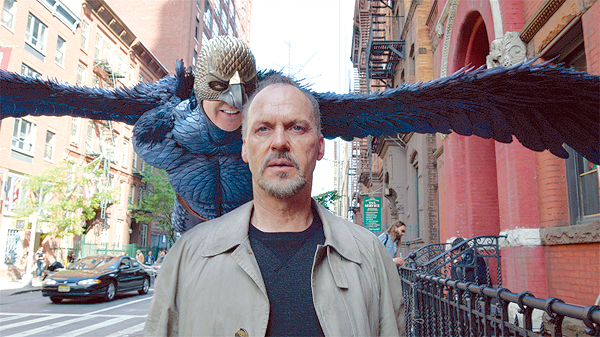Henry David Thoreau once said, “The mass of men live lives of quiet desperation.” He was thinking about men like Riggan Thomson, the protagonist of Birdman: Or, the Unexpected Virtue of Ignorance, which won the Academy Award for Best Picture just a few weeks ago. I finally watched it. It’s a very funny film, particularly if the viewer knows a thing or two about actor culture or the current dilapidated state of Hollywood. More than satire, though, Birdman is a contemplation–no less serious for being witty–on the inner life of a man who at age 60 is determined to not go gentle into that good night of public irrelevance.
Riggan (played to perfection by Michael Keaton) lives for three things. First is his tepid relationship with his daughter Sam who has also felt irrelevant, not to the public but to her image-obsessed father. Second is a voice Riggan hears, the voice of Birdman–the character he played years ago for three worldwide blockbuster films. It was through Birdman that Riggan became significant and loved in the world. Nowadays Birdman mocks and berates Riggan, and warns him that the only way to find meaning again is to embrace the character once again. Lastly is Riggan’s play, the driving force of the film’s plot. In an attempt to stage a comeback into public life, Riggan writes, directs, and stars in his adaptation of Ray Carver’s What We Talk About When We Talk About Love. The play consumes his energy, becoming an obsession and, of course, beset with all kinds of hilarious problems.
Birdman reminded me of another Oscar-winning picture about man’s search for relevance. American Beauty, directed by Sam Mendes, won Best Picture in 1999. It’s a dark, deeply postmodern story about a middle aged man who upends his marriage, family, and career to protest his own insignificance. Like Riggan Thomson, Lester Burnham (Kevin Spacey) fears the loss of youth, respect, and meaning. He quits his job, blackmails his boss, buys a sportscar and lusts after his daughter’s classmate. He wants a rebirth, a second go around at the optimism and joy that he’s lost in his adulthood.
Hope is the unseen protagonist of both Birdman and American Beauty. Lester and Riggan rage against the belief that their lives are ultimately irrelevant by holding out hope in either critical adoration (Riggan) or sexual confidence (Lester). One reason I find Birdman to be a more compelling film than American Beauty is that Riggan’s behavior is more consistent with how men try to manipulate their lives to magnify their personal worth. For those without vast safety nets of wealth, quitting work and making advances toward a minor has a low cost-benefit ratio. By contrast, Riggan sees meaning only in his work and the praise others might give it. He structures his entire worldview of self around how an audience responds to him. There are men in my office who have far more in common with Riggan than they’d admit.
In Ecclesiastes, Solomon despairs of the irrelevance of life. Not even the power of the throne, the wealth of nations or the pleasure of a harem can actually make what Solomon does meaningful. “All is vanity and striving after wind,” he writes. What is done will be undone, then done again. Solomon concludes that the only reality that isn’t futile is God. God never leaves and returns. God is the Real, the Lasting, the only one of whom it cannot be said, “This too shall pass.” That’s why the end of Ecclesiastes ends on a distinctly pious note: “The end of the matter…fear God and keep his commandments.”
The ending of Birdman strongly hints that there was much more to who Riggan was than people knew. Without spoiling, I could even say that the ending hints that Riggan might not even be quite who we think he is, and his suffering may not have been merely a cry for public relevance. It suggests that Riggan’s real struggle was living in denial of who he really was. Embracing his real identity is his path to fulfillment and peace.
Consider Birdman a parable about the vanity of life apart from knowing who we really are. For Solomon, our identity is bound up with God’s. That God is really there and really speaking is the gravitational center of our existence. If God is real, and speaking to us, then our lives do indeed mean something rather than nothing. Riggan’s true identity spoke to him throughout the story, reminding him that he was not ultimately not a washed up, broken actor but something much greater. When he finally believed, he was finally free.
Image: Copyright 2014 Fox Searchlight. Source: Clevescene.com.












